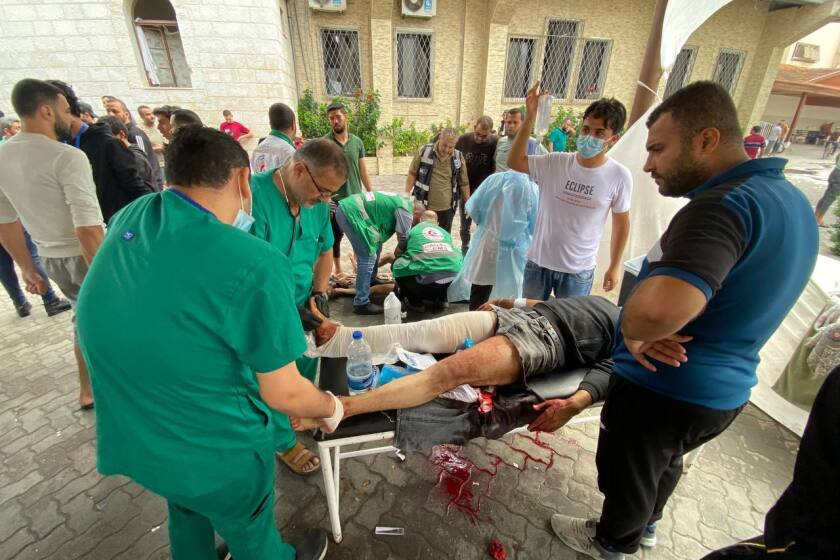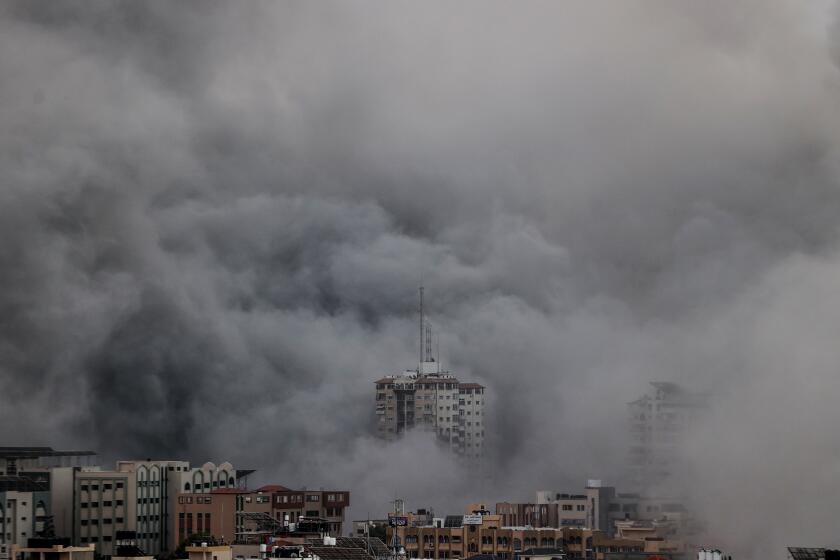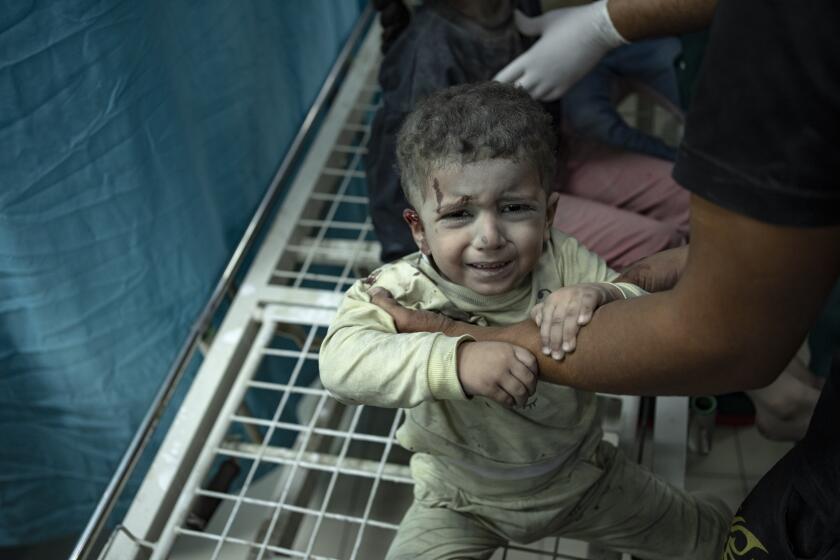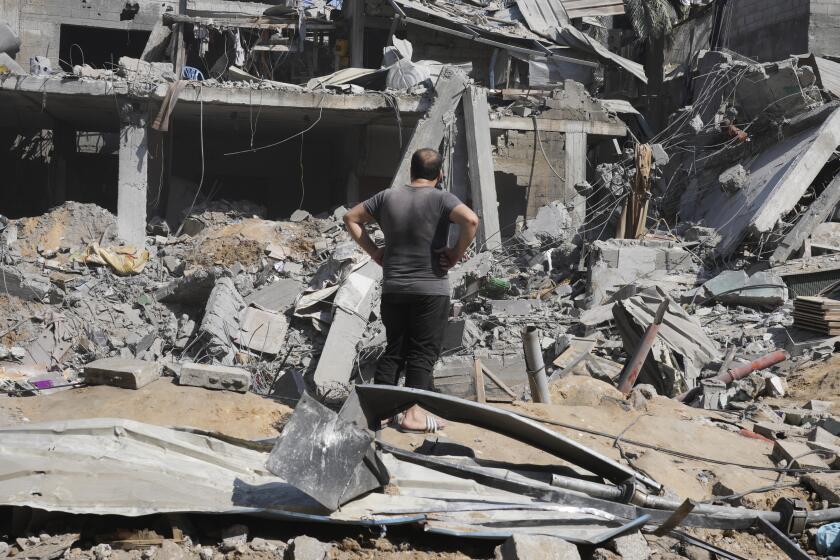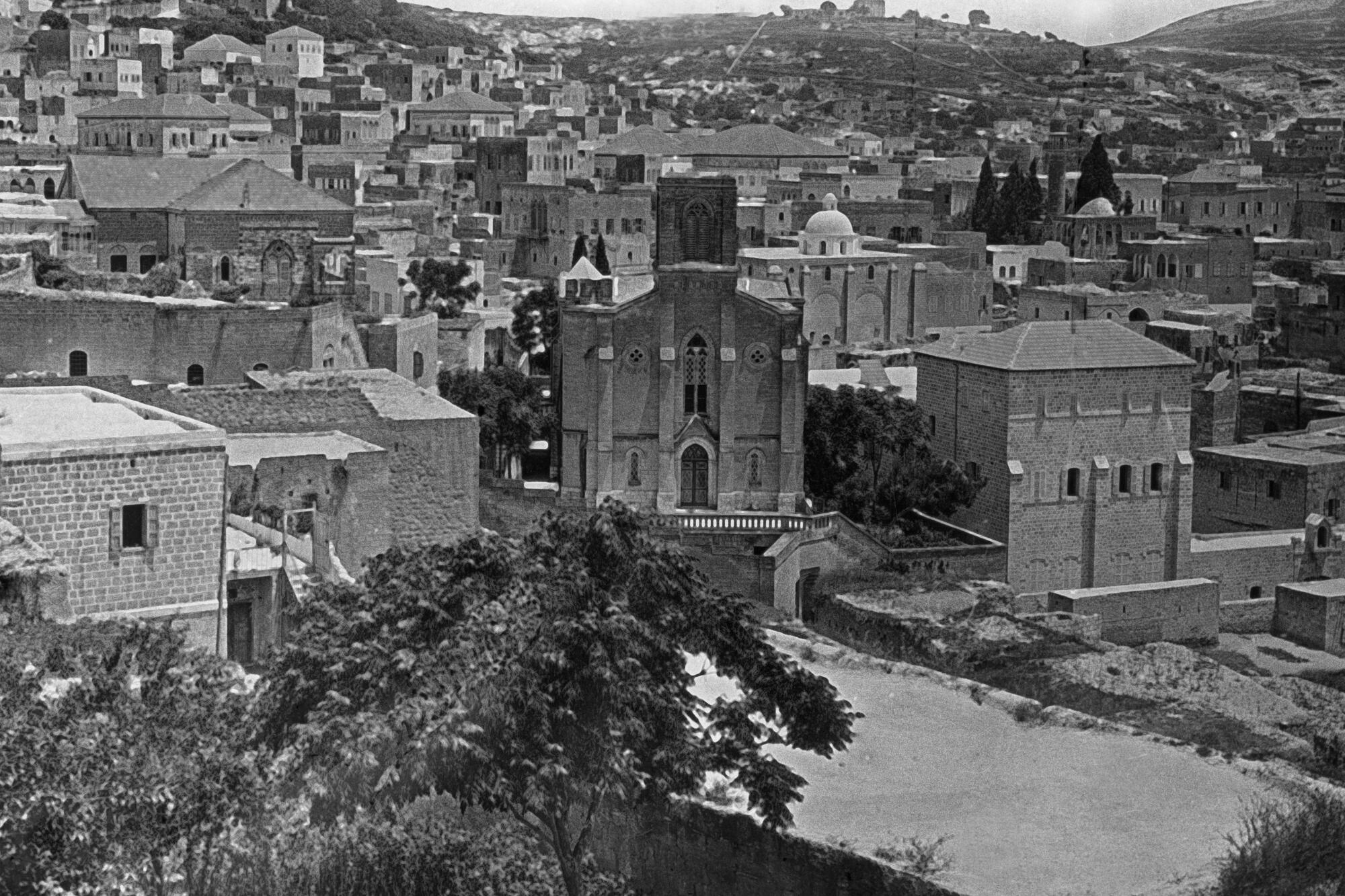
- Share via
My parents were Palestinian refugees who managed to rent an apartment in the city of Nazareth after their village, Ma’Alool, 10 miles to the west, was destroyed by the advancing Israeli army in 1948. My father, a cobbler, took his trade to Nazareth’s historic bazaar. From the little shop he rented I was able to watch shoppers as they went about their day. In between brewing cups of coffee for friends and family, my father would remind me to take note of all the people who would pass by: Arabs, Jews, Christians and Muslims. The market thrived when people came together.
I was not blind to the second-class nature of my existence in Nazareth, but my parents made sure to lead by example. For example, my father routinely asked that I carry the grocery bags of elderly women to the bus station at least a quarter of a mile away from his shop. I did not mind doing so until the day he asked me to carry them for a Jewish lady who lived in upper Nazareth.
Gaza hospitals are collapsing. As a mother there, I wonder why we bring children into this world if they will suffer.
This was land that had been confiscated by the Israeli government, and my immediate reaction was to tell my father that I had no interest in helping a woman whose forefathers had destroyed Ma’Alool. Yet his answer was always the same: “You do not know, and neither do I, what her reasons for being here in Palestine are. But helping elderly women is in our blood, and you will go and ask her if she needs your assistance.”
And so, the scene would repeat itself, a young Palestinian boy helping an old Jewish woman with her shopping bags. The magic was not in the action, but in what came after. Once she was on the bus with her bags, she would look at me from the window and say, “Toda Raba,” Hebrew for “thank you very much.” I would reply, “Shukran,” Arabic for “thank you.” In her face, I would see my grandmother’s face. In those moments, I understood my father’s lessons.
The Palestinian coders and techies I worked with built bridges to Silicon Valley. Amid Israel’s bombing, their vision of a new future for Gaza is crushed.
But, like any young person, I did not always listen. Yes, I had memories of helping my cousins get event spaces ready for weddings and parties that often ended with Palestinian and Jewish guests and workers eating and drinking into the early hours of the morning, many drunkenly standing with arms around one another’s shoulders. But the parties would end with the Palestinians veering east toward Nazareth and the Jews going west toward Haifa, bonds of brotherhood broken by geography and identity.
But there were also memories of speaking with my parents, grandparents and older relatives who remembered the Nakba, the destruction of our mixed Christian and Muslim village, the shame felt in watching Jewish settlers championing their takeover of a place that we called home.
My grandparents would tell me stories of the old village, the people they knew and the destruction that eventually befell them all. My grandfather especially seemed torn between sadness and bitterness, recalling the agricultural work he did with “our Semitic cousins,” only to watch as the newly arrived became part of a wave of Jewish settlers that ultimately pushed my family out of our land. My grandparents’ desperation became my own, conflicting with the lessons my parents tried to instill, even as I became an adult.
As a rabbi, I teach the value of every human life. That’s why I and other rabbis in the Jewish peace movement are demanding an immediate cease-fire in Gaza.
I remember one very cold December night, sitting with my mother in our dining room when the screeching of a car’s brakes pierced the night. My mother asked what had happened, and I reported back that Israeli soldiers in a military jeep had parked at the end of our street. They were likely looking for young Palestinians my age who were trying to retrieve what they could from their destroyed homes.
My mother asked me how many people were in that jeep, and after I told her between four and six, she went to the kitchen, returning a few minutes later with six cups of hot tea. She asked me to take them to the soldiers. I furiously refused, saying, “Those soldiers have destroyed your father’s village, Ma’Alool. Remember he was its mukhtar” — mayor. I have never forgotten her response. “I am a mother, and I know that the mothers of those soldiers are wondering if their sons and daughters are having something warm to drink on such a freezing night. That is what all mothers think about all over the world: the well-being of their children. Take these teacups to them right now.”
I took the tray and left the house, shivering from the cold. On my way, I dumped the hot tea on the street and waited a few minutes before coming back and giving my mother the empty cups. She looked at me with her angelic face and thanked me before saying her bedtime prayers.
My sisters are taking refuge north of Gaza City in a hospital and a school operated by the United Nations, but no place in Gaza is safe.
That was the first time in my life that I lied to my mother. I took an action in response to cruelty. A lesson of love had been taught, but not learned. It is a memory I carry to this day.
Nationalism based on identity and exclusion creates cycles of hate and violence that cannot square with pluralism and democracy. Intellectually at least, this is how I distinguished between Jewish people and Zionism, between American people and the actions of our government, between the call for Palestinian freedom and whatever it is Hamas claims to want.
But it has taken me the decades during which I moved to the United States, built a family and taught in Los Angeles high schools and universities for me to understand that my parents’ lessons never left me. It took me all that time to realize they held more wisdom than any book I read on my way to my PhD. I believe that a better world can be had, if only we would let our parents’ love guide our actions.
Watching Gaza crumble again, seeing empty chairs set in memorial Shabbat dinners, I wonder if any of those helping arm both sides and giving orders to kill and be killed grew up with parents who showed them the lessons my parents taught me.
Lifetimes of unlearned lessons leave us seeing cycles of violence and hate once again. All I can do now is hold my grandchildren close and try to pass along what my parents taught me a long time ago.
Ghassan Bisharat is a Palestinian American, a retired assistant professor of political science at Cal State Los Angeles and a former high school social science teacher.
More to Read
A cure for the common opinion
Get thought-provoking perspectives with our weekly newsletter.
You may occasionally receive promotional content from the Los Angeles Times.
